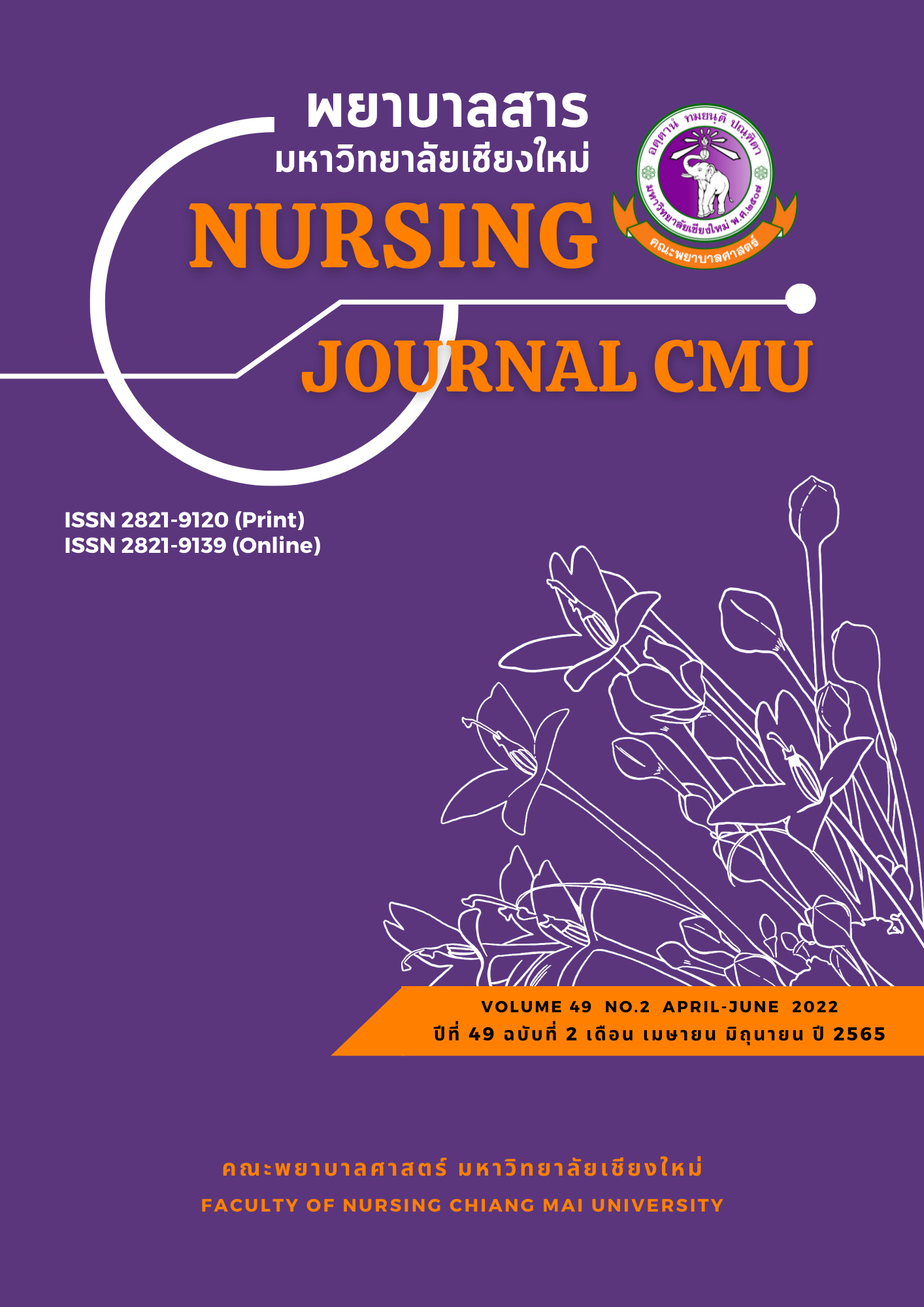Effects of a Self-Regulation Program on Dietary Management and Blood Sugar Levels Among Persons with Uncontrolled Type 2 Diabetes in a Community
Keywords:
Blood sugar level, Dietary management, Uncontrolled type 2 diabetes, A self-regulation programAbstract
Proper consumption in persons with type 2 diabetes is essential for controlling blood sugar levels. This quasi-experimental research which included two groups, pretest-posttest, investigated the effects of a self-regulation program for dietary management and blood sugar levels among persons with uncontrolled type 2 diabetes in a community. The sample group consisted of persons with uncontrolled type 2 diabetes under the responsibility of the district health promotion hospital in Saraphi District, Chiang Mai, who were allocated, by simple random sampling, to a group which received the program or a group which received regular care. Then the sample were purposively selected based on the inclusion criteria, with 44 persons divided into a group which received the program (22 persons) and a group which received regular care (22 persons). The instruments utilized in the study included the self-regulation program, designed by the researcher and based on the self-regulation concept, which included 3 main processes: 1) self-observation of dietary management; 2) judgment process on dietary management; and 3) self-reaction on dietary management by having the activity done twice. Furthermore, a dietary management guide, media and equipment, a successful model of self-care, and a blood sugar level meter were included. The data-collecting instruments consisted of a demographic data questionnaire, a dietary management practice questionnaire, and a blood sugar level record. The data were analyzed using a paired-sample t-test and an independent-sample t-test.
The results revealed that the group which received the program had significantly higher average scores for dietary management than before participating in the program (p = 0.001), and more than the group that received regular care (p = 0.039). There was also a significant reduction in blood sugar level compared with the measurement before their participation in the program
(p = 0.020). Blood sugar level also decreased more than that of the group which received regular care (p = 0.013).
The findings revealed that self-regulation programs for dietary management in persons with type 2 diabetes can be used to promote modification of dietary management and could lead to control of blood sugar level in uncontrolled type 2 diabetes in a community.
References
Aekplakorn, W. (Eds). (2016). Report of the Thai people’s health survey by physical examination No. 5, 2014. Retrieved from http://www.thaiheart.org/images/column_1387023976/NHES5_EGATMeeting13Dec13.pdf (in Thai)
Bandura, A. (1991). Social cognitive theory of self-regulation. Organizational Behavior and Human Decision Process, 50, 248-287.
Chatterjee, S., Riewpaiboon, A., Piyauthakit, P., Riewpaiboon, W., Boupaijit, K., Panpuwong, N., & Archavanuntagul, V. (2011). Cost of diabetes and its complications in Thailand: A complete picture of economic burden. Health & Social Care in the Community, 19(3),289-298.
Cressey, C. (2015). Diabetes: Fundamentals and related laboratory tests (2nd ed.). Chiang Mai: Chiang Mai University Press. (in Thai)
Diabetes Association of Thailand. (2017). Clinical practice guideline for diabetes. Retrieved fromhttps://www.dmthai.org/attachments/article/443/guideline- diabetes-care-2017.pdf(in Thai)
Diabetes Association of Thailand. (2019). Diabetes care 2019. Retrieved from https://www.dmthai.org/index.php/ knowledge/healthcare-providers/cpg/810-diabetes-care-2019 (in Thai)
Duangsanjun, W., Sangsuwan, T., & Poncumhak, P. (2021). Perceived behavioral control and food consumption behaviors among older persons with uncontrolled diabetes. Regional Health Promotion Center 9 Journal, 15(38), 428-442. (in Thai)
International Diabetes Federation. (2019). IDF diabetes atlas (8th ed.). Retrieved from https://diabetesatlas.org/ upload/resources/previous/files/8/IDF_DA_8e-EN-final.pdf
Institute of Medical Research and Technology Assessment. (2014). Literature review of current situation and service models of non-communicable disease (1st ed.). Bangkok: Art Qualified. (in Thai)
Kaewpho, C., Charoenpan, C., & Pansila, V. (2015). Effects of dietary modification programs by using food exchange for behavior control of blood sugar levels in patients with type 2 diabetes Pratongkham District, Nakhon Ratchasima Province. KKU Journal for Public Health Research, 8(3), 12-20. (in Thai)
Kanglee, K. (2014). Factors associated with glycemic control among people with type 2 diabetes mellitus at Phramongkutklao Hospital, Bangkok. Journal of The Royal Thai Army Nurses, 15(3), 256-268. (in Thai)
Khanthacha, S., & Muktabhant, B. (2021). Association of self-care behaviors and beliefs about diabetes with glycemic control of type 2 diabetic patients in a multiethnicity area, Nakae District, Nakhonphanom Province. Srinagarind Medical Journal, 36(1), 97-104. (in Thai)
Kongjaren, S., Wattana, C., & Harnirattisa, T. (2013). Effects of a self-regulation program for blood pressure control on self-regulation behaviors, blood pressure level and stroke risk. Nursing Journal, 40(1), 23-33.
Ministry of Public Health. (2020). KPI Report of NCD Clinic Plus 2020: Percentage of diabetic patients with good blood sugar control. Retrieved from http://hdc2.cbo.moph.go.th/hdc/reports/page_kpi.php?flag_kpi_level=9&flag_kpi_year=2020. (in Thai)
Nasab, M. N., Ghavam, A., Yazdanpanah, A., Jahangir, F., & Shokrpour, N. (2017). Effects of self-management education through telephone follow-up in diabetic patients. The Health Care Manager, 36(3), 273-281.
Poorat, J., Pichayapinyo, P., & Lagampan, S. (2020). Effects of self-regulation program on glycemic control in patients with uncontrolled type 2 diabetes. Kuakarun Journal of Nursing, 27(1), 20-33. (in Thai)
Sarapee District Public Health. (2019). Documentation for supervision controlling monitoring of public health 2562. Retrieved from https://www.chiangmaihealth. go.th/cmpho_web/document/190710156274 504289.pdf (in Thai)
Srisaket, J., Chaisa, P., Wanchai, A., Meeboonmak, Y., & Phokhwang-Just, W. (2017). Diet consumption behavior modification patterns to control blood sugar levels of patients with diabetes in Thailand: A systematic review. EAU Heritage Journal Science and Technology, 11(2), 156-170. (in Thai)
Suthirit, S., Pinchaleaw, D., & Keskomon, T. (2018). The effectiveness of self regulation program with line application among overweight health volunteers, Tharongchang District, Surat Thani Province. Journal of the Police Nurses, 10(2), 330-339. (in Thai)
Wattanakul, B., & Nhamkam, S. (2014). Risk perception, T2DM, diabetes complications. Journal of Nursing and Health Care, 32(3), 61-68. (in Thai)
Downloads
Published
How to Cite
Issue
Section
License
Copyright (c) 2022 Nursing Journal

This work is licensed under a Creative Commons Attribution-NonCommercial-NoDerivatives 4.0 International License.
บทความที่ได้รับการตีพิมพ์เป็นลิขสิทธิ์ของวารสารพยาบาลสาร
ข้อความที่ปรากฏในบทความแต่ละเรื่องในวารสารวิชาการเล่มนี้เป็นความคิดเห็นส่วนตัวของผู้เขียนแต่ละท่านไม่เกี่ยวข้องกับมหาวิทยาลัยเชียงใหม่ และคณาจารย์ท่านอื่นๆในมหาวิทยาลัยฯ แต่อย่างใด ความรับผิดชอบองค์ประกอบทั้งหมดของบทความแต่ละเรื่องเป็นของผู้เขียนแต่ละท่าน หากมีความผิดพลาดใด ๆ ผู้เขียนแต่ละท่านจะรับผิดชอบบทความของตนเองแต่ผู้เดียว






